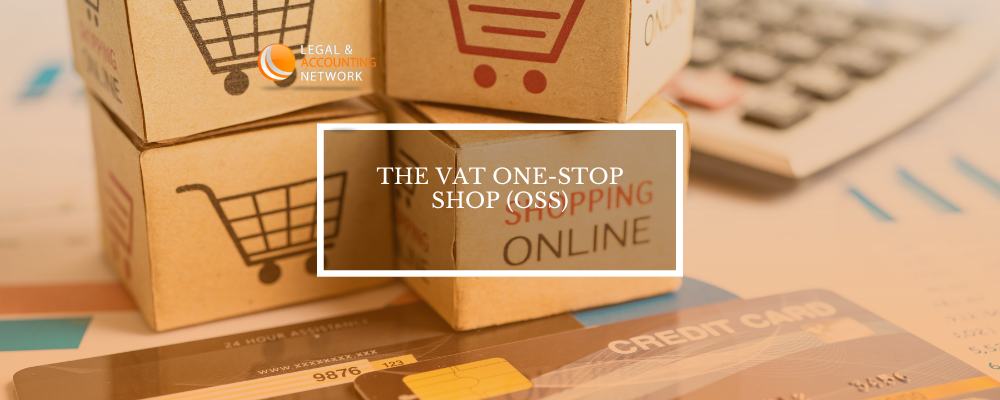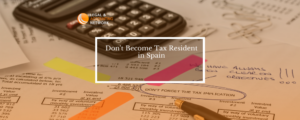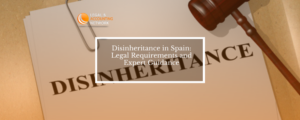What is One Stop – Shop (OSS)?
The VAT One-Stop Shop, ruled through the new Royal Decree-Law 7/20 of 27 April, aims to tax ecommerce at destination and reduce the administrative burden for entrepreneurs who make cross-border sales.
The aim of these regulations is to adapt to the rule of taxation of VAT at the place of destination, instead of at origin, as has been the case until now.
This ensures that VAT is paid where the goods and/or services are consumed.
The VAT One-Stop Shop, also known as OSS, includes all services provided to EU final consumers, and distance sales of goods to EU buyers, whether the contact is direct between buyer and seller, or through an Electronic Interface (online marketplaces or platforms that allow transactions between a buyer and a seller through them).
The one-stop shop is an electronic system whereby a company or professional can register in a Member State of the European Union (Member State of identification), and that registration is valid for the whole of the European Union.
Thus, the company or professional does not have to register in each and every one of the Member States in which it has its final consumers, but through the Member State of Identification it will comply with the tax obligations derived from the operations included in the One-Stop-Shop in the rest of the Member States.
In other words, you can declare and pay the VAT due on all cross-border sales within the scope of the OSS in the EU from the country in which you are registered.
This system allows trade to be streamlined. The final consumer will know from the moment of purchase the final price, including taxes, and therefore the transaction will also be more transparent.
Who does One Stop – Shop (OSS) affect?
Everyone in the e-commerce supply chain is affected, from online sellers and marketplaces/platforms both inside and outside the EU, to postal operators and couriers, customs and tax administrations, right through to consumers.
There are three Optional OSS Schemes
The One Stop Shop (OSS) consists of three optional schemes that simplify VAT formalities for businesses or professionals supplying goods and/or services to the end consumers throughout the EU:
- Non-EU Scheme (EUOSS)
- EU Scheme (UOSS)
- Import Scheme (IOSS)
All three types of transactions relate exclusively to supplies made by business or professionals to the end consumers (B2C transactions).
With this system they do not have to identify themselves and register in each Member State of consumption, but can instead:
- Register for VAT purposes electronically in a single Member State for all eligible sales of goods and services to customers located in any of the other Member States.
- Submit a single electronic VAT return in the Member State of identification and settle the VAT due on all these sales of goods and services in a single payment.
1. Non-EU scheme (EUOSS)
This scheme shall be open to businesses or professionals not established in the EU who provide services to persons who are not businesses or professionals acting as such and who are established in the EU.
Even where such a taxable person, albeit not established, is registered or required to register for VAT purposes in one of the Member States in respect of supplies other than business-to-consumer services, they may still benefit from the non-EU scheme in respect of business-to-consumer services.
The special scheme shall apply to all provisions of services which are to be deemed to be supplied within the EU.
2. EU Scheme (UOSS)
The scheme is open to businesses or professionals who carry out the transactions covered by the scheme, whether or not they are established in the EU.
However, the transactions to be declared under the scheme vary depending on whether or not the taxable person is established in the EU. In particular:
· Businesses or professionals established in the EU will include in the scheme:
1. Provision of services to persons who are not businesses or professionals acting as such, and who are established in the EU, but in a Member State other than that of the business or professional covered by this special scheme, provided that the services are provided in a Member State in which the business or professional is not established.
If the provision of services is in the Member State of the place where the business operates or in a State where they are established for VAT purposes, these supplies must be declared in the country concerned under the general VAT system, not under the UOSS system.
2. Intra-EU distance selling of goods, including those that are located in the Member State where the taxable person is registered as well as those that are located in another Member State where they are established for VAT purposes.
What is relevant is that this is distance selling, with transport of the goods between two different States, with the status of the business or professional as established in the place of arrival of the goods being irrelevant.
· Businesses or professionals not established in the EU
Businesses or professionals not established in the EU may only declare intra-EU distance selling of goods under the EU scheme.
· Electronic interfaces
Electronic interfaces (established inside or outside the EU) that are considered taxable persons for the supply of goods by law, will include in the scheme:
- Intra-EU distance selling of goods where the seller of the goods is not established in the EU.
- Domestic supplies of goods (without transport from one Member State to another) where the seller of the goods is not established in the EU.
- Where the electronic interface also makes direct sales of its own goods or services, it shall also include them in the EU scheme or in the Non-EU scheme as appropriate.
3. Import Scheme (IOSS):
There has also been one created for Imports called IOSS, which stands for Imports One-Stop Shop. The imports system includes distance sales of goods sent from outside the European Union, for a value not exceeding €150 and which are not subject to excise duties.
What transactions are covered?
- Distance sales of goods within the EU carried out by suppliers or deemed suppliers (electronic interfaces)
- Domestic sales of goods by deemed suppliers (electronic interfaces)
- Supplies of services by EU and non-EU sellers to consumers in the EU
- Distance sales of goods imported from third territories or third countries carried out by suppliers and deemed suppliers, except for goods subject to excise duties
The benefits are wide and varied
- When buying goods online from outside or inside the EU, Consumers know that the VAT rate applied is the same as for goods acquired in their home country as VAT is paid where consumption of goods takes place.
- EU businesses can grow in a simplified, fairer environment and overcome the barriers to cross-border online sales - the European Digital Single Market aims to make technology work for people in a fair and competitive digital economy.
- EU citizens can see public revenues increase - thanks to increased VAT payments and less VAT fraud, all Member States benefit.
How does the system works from 1 July 2021?
Direct sales of goods or services to final consumers located in other EU Member States will continue to be subject to Spanish VAT, as long as the limit of €10,000 is not exceeded.
As soon as the annual limit of €10,000 of sales to private individuals in other Member States is exceeded, the VAT corresponding to the State of the final consumer where the goods are supplied must begin to be applied. To speed up the procedure, you can register in the OSS one-stop shop system, using form 035.
The obligation is to register in a member state and it is there that they submit the declaration and pay the VAT on all distance sales of goods and cross-border supply of services to end-consumer customers within the EU.
Only if you do not exceed €10,000 of distance sales in Europe in a year can you deregister from the system, but if you exceed this limit again, you would have to re-register.
The VAT charged to purchasers and end consumers, in each country, will be paid to the tax authorities by means of Form 369. This form details the VAT base and quotas accrued in each Member State.
The company will also declare the taxable base for Intra-Community transactions in box 123 in its normal VAT liquidation (form 303).
What happens with Imports of goods?
From 1 July 2021, the VAT exemption on imports of small consignments of a value of less than 22 Euros was eliminated. This means that all goods imported into the European Union will be subject to VAT.
Imports of goods exceeding €150 remain unchanged in terms of the procedure applied until now. VAT on the import must be settled at the customs office of entry into the European Union.
However, in the case of distance sales of goods imported from third countries or territories to the European Union that do not exceed €150, the declaration and payment of VAT can also be speeded up and simplified through the Import One-Stop Shop, IOSS







